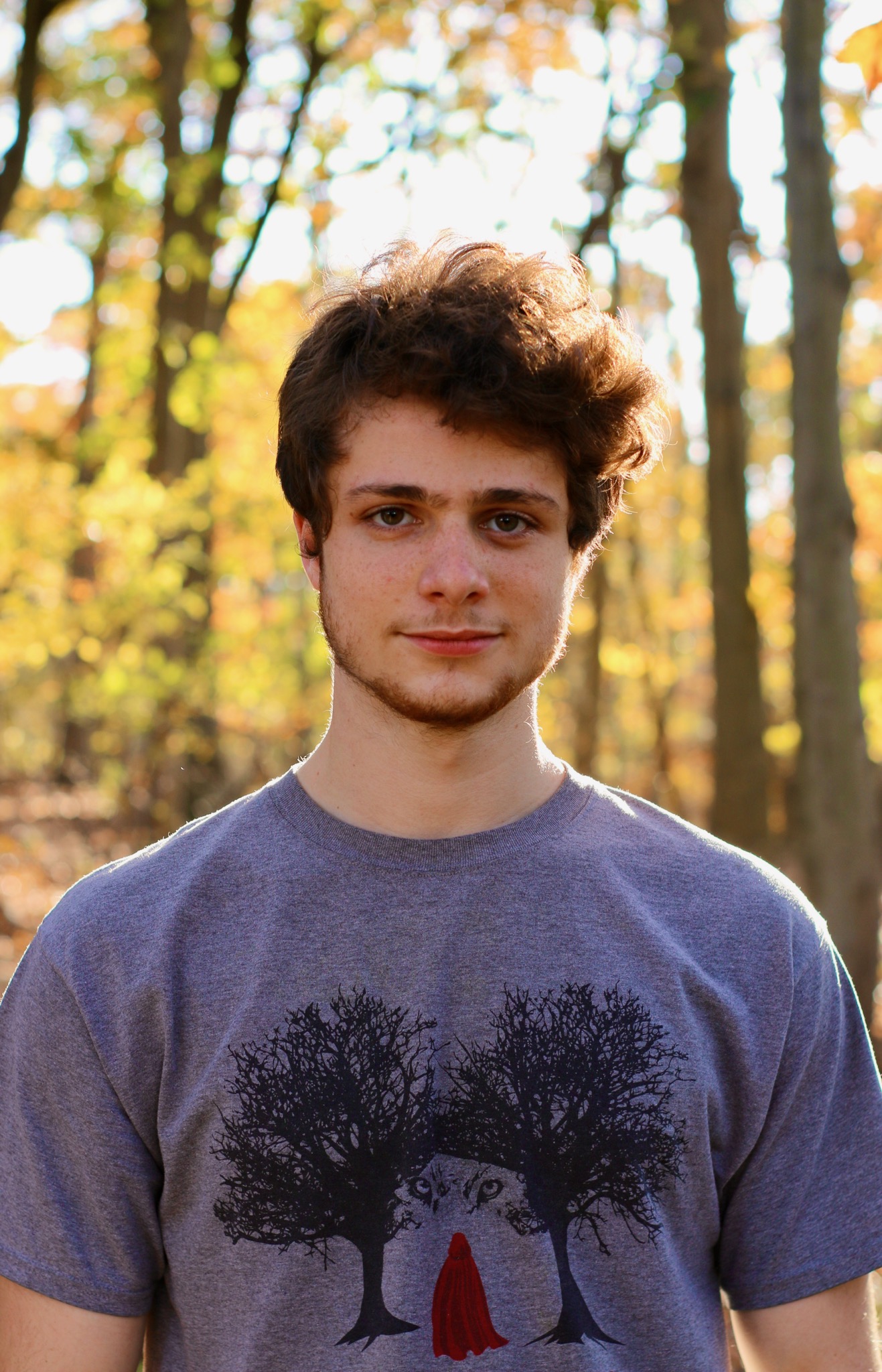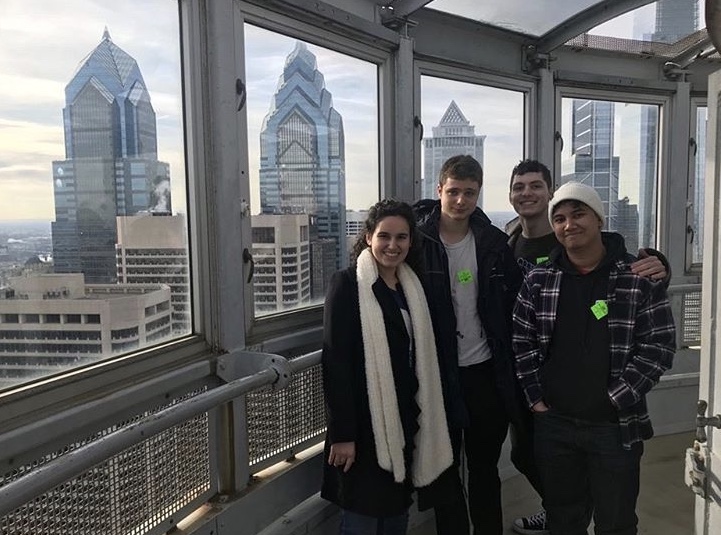In the Spotlight - Ephraim Bryski '22
Fall 2020

Tell us a little about yourself and what originally made you decide to study Civil Engineering at Stony Brook?
I am a Junior in Civil Engineering and I grew up in Brooklyn and went to Brooklyn Technical High School. I always enjoyed spending time in nature, whether in local parks or rural Maryland, and thus I decided to major in environmental science in high school. I was generally good at math and science, so it was reasonable to go into a STEM field. I also had fond memories of spending hours building domino structures when I was a child, and I would have said that I wanted to become an architect back then if you had asked. Ultimately, I chose civil engineering because it combined many of my interests into one.
How did you get involved in Stony Brook University Chapter’s ASCE and what led you to run as Secretary?
When I first came to Stony Brook, I started looking for ways to get involved on campus. I didn’t know much about ASCE when I signed up at the involvement fair, but I thought it would be a good way to find a community with that shared interest, as well as gain knowledge and experience. I recall seeing concrete cylinders (which I later found out were for Concrete Canoe) on the display table at the involvement fair, and that quickly piqued my interest. Along with attending general member meetings, I began participating in the newly established Steel Bridge competition. While Steel Bridge unfortunately ended partly due to funding issues, I have since become more involved in Concrete Canoe, where I have gained a great group of friends.
When ASCE executive board (e-board) elections came around during my freshman year, a few people suggested that I run for a position. I wanted to become more involved in the club so I took their suggestion, and I have now been elected Secretary two consecutive years.
Are you involved with any other organizations on campus?
In my sophomore year, I started a position as a peer tutor at the Academic Success and Tutoring Center (ASTC), and this tutoring has continued with COVID over Zoom. Currently, I tutor students one-on-one in Calculus. It’s possible teaching will become part of my career if I go into academia, so it’s nice to get some experience now. It also allows me to review the material and delve deeper into the subject than I otherwise would have. When I actively listen to students, they discuss things that I would never have thought of myself.
Additionally, I started doing research with Dr. Kirane over the summer between my sophomore year and junior year. We were initially studying how sandstone reacts to creep, or gradual deformation under loads. Over the summer, I created computer models of rock samples on Abaqus. This semester, we began testing the actual rock samples in the lab. As we shift the focus of our research to the nanoscale, I am now using Molecular Dynamics software to analyze the effect moisture has on these rocks. When I was learning the basics of molecular chemistry in high school and college, I never expected to use it later, in a different context – it just goes to show how interconnected these subjects can be!
Are you conducting undergraduate research with Dr. Farhadzadeh this fall? Can you share anything about these projects? What excites you most about research?
I began research in the fall semester of my freshman year. After searching for projects I would be interested in, I contacted Dr. Farhadzadeh, and after some exchanges I started by doing literature reviews. These reviews gave me the background for the project, which was a statistical analysis of debris motion to predict their impact during floods. Though I did some work in the lab, most of the effort was computer work, specifically developing MATLAB code for tracking the debris from video footage. The work analyzing the data was challenging: something would occasionally go wrong, and each time that happened, there was the lurking fear that I would have to start again from scratch. It took some time for me to get used to this process of trial and error. However, it became an invaluable and rewarding experience: we ended up using my method and my code for analyzing video footage, and this fall we are in the process of finalizing the paper which documents our results.
Over the summer after my freshman year, I worked as a research intern at the Hinsdale Wave Research Lab at Oregon State University. I can honestly say that my experience there was truly unique. Just being away in Oregon was a welcome change from my demanding first year of college. I spent the summer analyzing data from a previous experiment on the effect of elevation of houses on wave-induced damage with MATLAB. While I was hoping to do experimental work, I soon became engrossed in the research.
The time at Oregon also gave me a unique perspective on how research is conducted in bigger departments. The collaboration between people of all positions and the open discussion of ideas stood out to me. Those in higher positions would talk to everyone else in the lab as friends and peers, and the discussions would be substantive; they often went into the nitty-gritty of on-going research. This is the type of environment I would like to work in throughout my career.
In my sophomore year, I helped create a map of Lake Erie coastal structures with ArcGIS. With Dr. Farhadzadeh, we also studied the strengthening effect of calcium carbonate on bluffs. This was my first real time doing experimental work, with tasks such as sifting sand and changing water elevation. Sadly, the work was cut off in part due to COVID, but I’m hoping to continue it sometime in the future.
Touching on something that no one has seen before is what pulls me into research. I have come to understand that it’s often a slow and messy process in which there are bound to be issues. You may spend months working on something without knowing if you made any real contribution, but there are momentary glimpses where you may have found something new and that is very exciting.
What are your plans for next year and after graduation?
Senior year I will finish my technical electives and take Senior Design. I’ve gradually started to focus my interests, and right now my main interest is coastal engineering, because I enjoy analyzing the incredible complexities of natural systems. A favorite example of mine is the interaction between fluids and solids. Specifically, waves crash into the coast, gradually shaping it, which then changes how the water behaves.
Hopefully, I will also be a part of the Accelerated Program and taking graduate courses. I also intend to continue research under Dr. Farhadzadeh and Dr. Kirane as well as become more active in Concrete Canoe.
I hope to continue working on a website for interactive visualization of civil engineering concepts. As of now, they are on MATLAB and are only for Solid Mechanics; they can be found here. During winter break and into the following year, I plan on transferring them under the domain seeciv.com and expanding to other subjects. I’m grateful for the advice from Dr. Kirane as well as students Jonathan Craig, Emily Sonant, Kenechukwu Ejinkonye, and Raymond Betances; because I’m not experienced in web development, these later stages will be much more of a team effort. I’m excited to see how it ends up!
Lastly, I plan on continuing my education after I graduate from SBU, although I’m not yet sure what field of study and where. I’m also considering applying for jobs and going to work immediately after graduation.
What is your “dream job”?
My idea of a dream job would be one where I could both continuously study theory, but also see how it applies in a tangible and practical way. I have an image of myself traveling to a sea coast to collect data, then going back to the lab the next day to analyze the results, spending some time thinking about the theory, and then finally discussing the data and research progress with my team. It’s the combination of research, application and discussion that entices me. Ultimately, I want to work in a job that will positively change society.
Looking back on your academic journey thus far, what was your favorite CIV class/classes and why?
My favorite CIV classes so far have been CIV 310 (Structural Analysis) and CIV 305 (Transportation Systems Analysis I). Even though both of these courses this fall have been online, both Dr. Celli (310) and Dr. Yazici (305) have been very engaging and enthusiastic. I admit that I was not so interested in transportation at first, and I wasn’t really looking forward to CIV 305. But contrary to my expectations, the course has been engaging and almost conversational at points, and I was able to gain an appreciation and intuition for the subject. I did have an interest in Structural Analysis, and Dr. Celli allowed me to explore the subject more deeply, particularly through office hours.
What suggestions do you have for students who are looking to improve their time management skills?
My main suggestion is to figure out what works for you. I think applying one’s focus entirely on specific tasks enables someone to use their time more effectively. However, I do admit to struggling with this a bit more with online classes.
What do you enjoy doing most in your free time?
My favorite activity is going out biking, both in Brooklyn and in Stony Brook. While there are parks, reserves, beaches, and trails, I often go without a plan and see where I end up exploring. It is incredibly calming and is often needed during stressful times.

